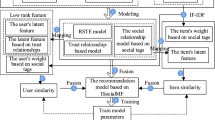Abstract
As for the data sparsity and cool boot problem, this paper brings forward a social network recommendation means combined with social tags and trust relations. It collects major information relating to social trust relations, item tag information and user rating matrix based on probabilistic matrix factorization. All the data resources from different dimensions are connected through shared users potential spaces (or item potential spaces). The above mentioned two types of spaces can be obtained by probabilistic matrix factorization.In this way, effective social recommendation means can be achieved. The results generated from Epinions and Movielens experiments reveal that the proposed algorithm is superior to the existing Trust-based Social Recommendation or Social Tag Recommendation especially for active users with only a few rating records.





Similar content being viewed by others
References
Ma, H., Zhou, D., Liu, C., Lyu, M.R., King, I.: Recommender system with social regularization. In: Proceedings of the 4th ACM International Conference on Web Search and Data Mining (WSDM), pp. 287–296 (2011)
Zhao, W., Guan, Z., Liu, Z.: Ranking on heterogeneous manifolds for tag recommendation in social tagging services. Neurocomputing 148, 521–534 (2015)
Li, Y., Tian, Q., Gao, H.: Kernel discriminant learning for ordinal regression using label membership. J. Data Acquis. Process. 31(3), 532–540 (2016)
Qin, Y., Yu, Z., Wang, Y., et al.: Micro blog user label interest clustering method based on feature mapping. J. Data Acquis. Process. 30(6), 1246–1252 (2015)
Martins, E.F., Belém, F.M., Almeida, J.M., et al.: On cold start for associative tag recommendation. J. Assoc. Inf. Sci. Technol. 67(1), 83–105 (2016)
Rawat, Y.S., Kankanhalli, M.S.: ConTagNet: exploiting user context for image tag recommendation. In: ACM on Multimedia Conference, pp. 1102–1106. ACM, New York (2016)
Heymann, P., Koutrika, G., Garcia-Molina, H.: Can social bookmarking improve web search. In: Proceedings of the International Conference on Web Search and Web Data Mining, pp. 195–206. ACM, New York (2008)
Xu, Z., Zhang, H., Hu, C., Liu, Y., Xuan, J., Mei, L.: Crowdsourcing-based timeline description of urban emergency events using social media. IJAHUC 25(1/2), 41–51 (2017)
Puglisi, S., Parra-Arnau, J., Forné, J., et al.: On content-based recommendation and user privacy in social-tagging systems. Comput. Stand. Interfaces 41, 17–27 (2015)
Gabriel, H.H., Spiliopoulou, M., Nanopoulos, A.: Summarizing dynamic social tagging systems. Exp. Syst. Appl. Int. J. 41(2), 457–469 (2014)
Xu, Z., Liu, Y., Mei, L., Hu, C., Chen, L.: Generating temporal semantic context of concepts using web search engines. J. Netw. Comput. Appl. 43, 42–55 (2014)
Ramage, D., Heymann, P., Manning, C.D., et al.: Clustering the tagged web. In: International Conference on Web Search and Web Data Mining, Barcelona, Spain, pp. 54–63 (2009)
Wu, P., Zhang, Z.K.: Enhancing personalized recommendations on weighted social tagging networks. Phys. Procedia 3(5), 1877–1885 (2010)
Kurucz, M., Benczur, A.: Methods for large scale SVD with missing values. In: Proceedings of the KDD Cup and Workshop, USA, pp. 31–41 (2007)
Salakhutdinov, R., Mnih, A.: Probabilistic matrix factorization. In: Proceedings of the 21st Annual Conference on Neural Information Processing Systems, pp. 1257–1264. Curran Associates Inc., New York (2008)
Lee, D.D., Seung, H.S.: Learning the parts of objects by non-negative matrix factorization. Nature 401(6755), 788–791 (1999)
Jamali, M., Ester, M.: A matrix factorization technique with trust propagation for recommendation in social networks. In: Proceedings of the Fourth ACM Conference on Recommender Systems, pp. 135–142. ACM, New York (2010)
Zhang, F., Gong, T., Lee, V.E., et al.: Fast algorithms to evaluate collaborative filtering recommender systems. Knowl. Based Syst. 96(C), 96–103 (2016)
Adán-Coello, J.M., Tobar, C.M.: Using collaborative filtering algorithms for predicting student performance. In: Electronic Government and the Information Systems Perspective. Springer, New York (2016)
Dou, Y., Yang, H., Deng, X.: A survey of collaborative filtering algorithms for social recommender systems. In: International Conference on Semantics, Knowledge and Grids, pp. 40–46. IEEE, New York (2017)
Jiang, M., Cui, P., Wang, F., et al.: Scalable recommendation with social contextual information. IEEE Trans. Knowl. Data Eng. 26(11), 2789–2802 (2014)
Mylonas, P.: Types of contextual information in the social networks era. In: International Workshop on Semantic and Social Media Adaptation and Personalization, pp. 46–52 (2016)
Chen, H., Rahwan, I., Cebrian, M.: Bandit strategies in social search: the case of the DARPA red balloon challenge. EPJ Data Sci. 5(1), 1–14 (2016)
Dimitrov, G.P., Panayotova, G., Garvanov, I., et al.: Performance analysis of the method for social search of information in university information systems. In: Third International Conference on Artificial Intelligence and Pattern Recognition, pp. 1–5 (2016)
Acknowledgements
The research is supported by the Social development project of Lianyungang City, No. (SH1507). The research is supported by the top-notch Academic Programs Project of Jiangsu Higher Education Institution (PPZY2015a038), National Natural Science Funds of China (Grant Nos. 61403156, 61403155), the Prospective Joint Research of University-Industry Cooperation of Jiangsu (No. BY2016056-02). The Lianyungang Science and Technology Project under Grant CK1503, CXY1530, CG1611. The Science and Technology project of Jiangsu Province under Grant BN2016065.
Author information
Authors and Affiliations
Corresponding author
Rights and permissions
About this article
Cite this article
Li, H., Zhang, S., Hu, Y. et al. Research of social recommendation based on social tag and trust relation. Cluster Comput 21, 933–943 (2018). https://doi.org/10.1007/s10586-017-0962-9
Received:
Revised:
Accepted:
Published:
Issue Date:
DOI: https://doi.org/10.1007/s10586-017-0962-9




